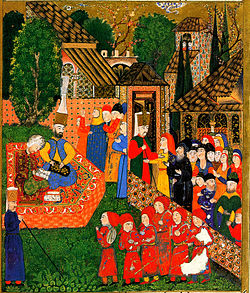Devşirme
Devşirme[1] (pajak darah) adalah praktik pengambilan anak laki-laki dari keluarga Kristen di Kesultanan Utsmaniyah yang kemudian akan diislamkan[2] dengan tujuan untuk menyeleksi dan melati anak yang paling cakap untuk menempati posisi kepemimpinan, baik sebagai pemimpin militer ataupun sebagai pengurus tinggi Kesultanan,[3] walaupun di Bosnia devşirme juga berlaku untuk keluarga Muslim.[4][5] Usia perekruitan yang ideal berkisar antara 7 hingga 10 tahun,[6] meskipun anak yang lebih muda juga direkrut. Karena anak yang direkrut dapat mencapai status Wazir Agung, di Bosnia beberapa orang tua Kristen menyuap petugas untuk mengambil anak mereka.[7] Namun, sistem devşirme tidak disukai[8] dan ditolak oleh penduduk lokal[9][10][11][12]

Catatan kaki
- ^ Bahasa Turki Utsmaniyah دوشيرمه, Yunani παιδομάζωμα, Paedomazoma - kumpulan anak-anak; bahasa Armenia: Մանկահավաք, Mankahavak') - pengumpulan anak; Rumania: tribut de sânge; Kroasia: Danak u krvi, Slovenia: Krvni davek, Bosnia dan Serbia: Данак у крви / Danak u krvi, Makedonia: Данок во крв / Danok vo krv, dan Bulgaria: Кръвен данък/ Kraven Danak - pajak darah
- ^ The New Encyclopedia of Islam, Ed. Cyril Glassé, (Rowman & Littlefield, 2008), 129.
- ^ Basgoz, I. & Wilson, H. E. (1989), The educational tradition of the Ottoman Empire and the development of the Turkish educational system of the republican era. Turkish Review 3(16), 15.
- ^ Perry Anderson. Lineages of the Absolutist State (Verso, 1974), p. 366.
- ^ Zdenko Zlatar. The Poetics of Slavdom: The Mythopoeic Foundations of Yugoslavia, Vol. 2 (Peter Lang, 2007), p. 581.
- ^ Taskin, U. (2008). Klasik donem Osmanli egitim kurumlari - Ottoman educational foundations in classical terms. Uluslararasi Sosyal Arastirmalar Dergisi - The Journal of International Social Research 1, 343–366.
- ^ Malcolm, Noel (1996). Bosnia: A Short History. London: Papermac. hlm. 46. ISBN 0-333-66215-6.
- ^ http://www.bbc.co.uk/religion/religions/islam/history/slavery_1.shtml#section_4; "...and point out that many Christian families were hostile and resentful about it - which is perhaps underlined by the use of force to impose the system.".
- ^ Yannaras, Christos, Orthodoxy and the West: Hellenic self-identity in the modern age, (Holy Cross Orthodox Press, 2006), 112.
- ^ Schindler, John R., Unholy terror: Bosnia, al-Qa'ida, and the rise of global jihad, (Zenith Press, 2007), 23.
- ^ Bostom, Andrew G. "Jihad Conquests and the Impositions of Dhimmitude - A Survey" in The Legacy of Jihad: Islamic Holy War and the Fate of Non-Muslims. Andrew G. Bostom (ed.) New York: Prometheus Book, 2005, pp. 41-46.
- ^ S. Trifkovic. The Sword of the Prophet: Islam; History, Theology, Impact on the World. p. 97
Pranala luar
Lihat entri devshirme di kamus bebas Wiktionary.
- "Devsirme" in "Encyclopaedia of the Orient"
- Website on the Ottoman empire - original German version; here its Janissary page (to be further exploited)
- Papoulia, B.D., Ursprung und Wesen der “knabenlese” im Osmanischen Reich. München, 1963 (in German, title means 'origin and nature of the 'boy harvest' in the Ottoman Empire)